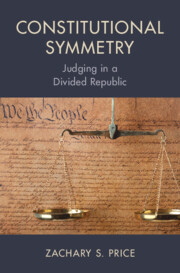Book contents
- Constitutional Symmetry
- Constitutional Symmetry
- Copyright page
- Dedication
- Contents
- Acknowledgments
- Introduction
- Part I Symmetry Explained
- Part II Symmetry Applied
- 5 Speech, Association, and Religion
- 6 Separation of Powers and Federalism
- 7 Equal Protection
- 8 Guns and Fundamental Rights
- 9 Law of Democracy
- Conclusion
- Index
8 - Guns and Fundamental Rights
from Part II - Symmetry Applied
Published online by Cambridge University Press: 14 November 2024
- Constitutional Symmetry
- Constitutional Symmetry
- Copyright page
- Dedication
- Contents
- Acknowledgments
- Introduction
- Part I Symmetry Explained
- Part II Symmetry Applied
- 5 Speech, Association, and Religion
- 6 Separation of Powers and Federalism
- 7 Equal Protection
- 8 Guns and Fundamental Rights
- 9 Law of Democracy
- Conclusion
- Index
Summary
This chapter addresses symmetry’s implications for gun rights and unenumerated fundamental liberties. Although recognizing an individual right to bear arms is inevitably asymmetric given current divides over gun regulation, the Supreme Court might moderate its decisions’ asymmetry in two ways: by allowing some meaningful room for firearms regulation, and by ensuring that the Second Amendment sometimes interferes with laws that are conventionally favored more by conservatives than by progressives. With respect to unenumerated rights, symmetry should support embracing some method for identifying such rights that avoids any predictable skew toward rights favored by one or the other major partisan or ideological camp. The Court’s current method of looking to “history and tradition” to define unenumerated rights could satisfy this standard, provided the Court applies it in a manner that allows recognition of new rights based on enactment of new laws over time in jurisdictions across the United States. In addition, the existing constitutional protection for parental rights, meaning parents’ authority to control key aspects of their children’s upbringing, appears not only defensible under the Court’s “history and tradition” approach but also symmetric given major current divides over certain parenting choices.
Keywords
- Type
- Chapter
- Information
- Constitutional SymmetryJudging in a Divided Republic, pp. 203 - 222Publisher: Cambridge University PressPrint publication year: 2024

